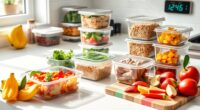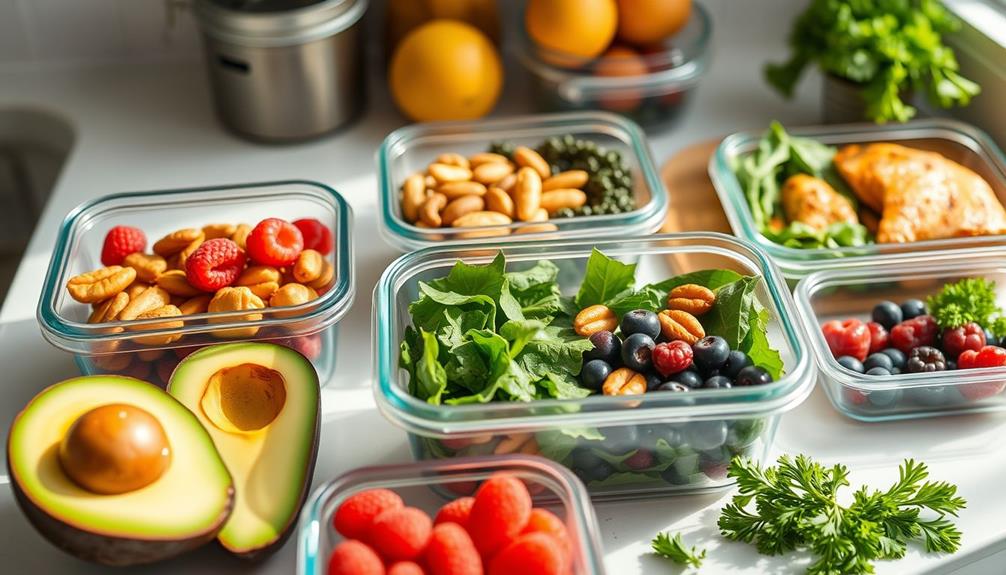If you’re short on time, start small by prepping simple, versatile ingredients like chopped veggies, cooked grains, and protein portions in airtight containers. Focus on batch cooking easy dishes or using one-pan recipes to save time. Plan your meals ahead, label everything, and keep a designated space for your prep supplies. By sticking to these straightforward tips, you’ll see how quickly meal prepping can fit into even the busiest schedule—keep going to learn more.
Key Takeaways
- Begin with simple, no-cook or one-pot recipes that require minimal prep and cooking time.
- Batch cook ingredients like grains and proteins in advance to assemble meals quickly during the week.
- Use airtight, labeled containers for organized storage and easy access to prepped ingredients.
- Plan meals ahead and create a shopping list to streamline grocery trips and reduce prep time.
- Start small with a few meals and gradually expand your prep routine as you become more efficient.

Starting meal prepping can seem overwhelming at first, but with a simple plan, it becomes manageable and even enjoyable. One of the best ways to make the process smoother is to focus on storage tips that keep your food fresh and organized. Invest in good-quality containers that are airtight and microwave-safe, making reheating and storing leftovers effortless. Use clear containers so you can easily see what’s inside, saving you time when deciding what to eat. Label each container with the date you prepared it, so you prioritize eating older meals first and reduce waste. Also, consider portioning your meals into single-serving sizes; this simplifies grab-and-go options and helps control your intake.
Start meal prep with airtight, clear containers labeled by date for fresh, organized, and waste-free meals.
When it comes to recipe customization, don’t feel obligated to stick to rigid plans. Instead, tailor your meals to your preferences and dietary needs. Pick versatile ingredients that can be mixed and matched throughout the week. For example, grilled chicken can be added to salads, wraps, or rice bowls, giving you variety without extra cooking. Incorporate different vegetables, grains, and seasonings to keep flavors exciting, so meal prepping doesn’t become monotonous. If you’re short on time, prep ingredients rather than entire meals. Chop vegetables, cook grains in bulk, or marinate proteins ahead of time. This way, when you’re ready to assemble a meal, you just combine your prepped ingredients, saving precious minutes.
To make the most of your limited time, plan your meals for the week in advance, and choose recipes that require minimal cooking or can be made in one pot or sheet pan. Batch cooking is your friend—prepare a large portion of a dish and divide it into individual containers. This approach reduces cooking time during busy weekdays and ensures you always have healthy options ready. Keep your pantry stocked with staples like canned beans, frozen vegetables, and spices, so you can quickly add variety to your meals without running to the store. Additionally, incorporating proper storage techniques helps extend the freshness of your ingredients and prepared meals, making your meal prep routine more efficient. Utilizing airtight containers can significantly prevent spoilage and keep your food tasting fresh longer. Furthermore, maintaining consistent storage practices can help you monitor and rotate your meals effectively, reducing waste and ensuring optimal freshness.
To further optimize your storage, consider using labels and color coding to organize your containers, so you can quickly identify meals based on ingredients or expiration dates. Finally, streamline your storage process by setting aside a dedicated space in your fridge or freezer for meal prep containers. Organize your containers so you can easily access what you need without rummaging through clutter. By implementing these storage tips and embracing recipe customization, you’ll find meal prepping more manageable, even with a packed schedule. The key is to start small, stay consistent, and adapt as you learn what works best for you. With a little planning, you’ll develop a routine that saves time and keeps your nutrition on track.
Frequently Asked Questions
What Are Quick Meal Prep Recipes for Busy Mornings?
For quick meal prep recipes on busy mornings, focus on simple breakfast ideas like overnight oats, breakfast burritos, or yogurt parfaits. These snack options are easy to prepare ahead of time and grab on the go. You can also pre-make breakfast sandwiches or muffins. Having these ready guarantees you time, ensures you start your day with a healthy meal, and keeps your mornings stress-free.
How Do I Store Prepped Meals Safely?
Many believe proper storage guarantees food safety, and it’s true—storing prepped meals correctly is essential. Use airtight containers to keep meals fresh, label them with dates, and refrigerate within two hours. For longer storage, freeze meals in portions. Follow storage tips diligently to prevent bacteria growth, ensuring your meals stay safe and delicious. Trust these practices to keep your food fresh and your health protected.
Can Meal Prepping Help With Weight Loss?
Meal prepping can definitely help with weight loss by making calorie counting and meal portioning easier. When you prepare your meals ahead, you control portion sizes and ingredients, reducing the chances of overeating. It also encourages mindful eating and helps you stick to your calorie goals. By dedicating time to plan and portion your meals, you set yourself up for consistent progress toward your weight loss goals.
What Tools Simplify the Meal Prepping Process?
Did you know that using simple tools can cut your meal prep time by up to 50%? To make meal prep easier, invest in meal prep shortcuts like stackable containers, a good sharp knife, and a slow cooker or instant pot. Staying organized with a well-structured kitchen setup helps you find tools quickly, saving you time and effort. With the right tools, you’ll enjoy stress-free meal prep even on busy days.
How Often Should I Update My Meal Prep Plans?
You should update your meal prep scheduling and plan adjustment frequency weekly or biweekly. This keeps your meals fresh, aligns with your changing tastes, and accommodates any schedule shifts. Pay attention to how your body responds and modify portion sizes or ingredients accordingly. Regular updates help you stay motivated and ensure your meal prep remains practical and enjoyable, making it easier to stick with your healthy eating goals.
Conclusion
Starting meal prepping may seem overwhelming at first, but with small steps, you’ll build confidence and consistency. Planning ahead, choosing simple recipes, and setting aside a few minutes will make a big difference. Embrace the process, enjoy the freedom of healthy choices, and celebrate each success. Remember, every meal prepped is a step toward a healthier, happier you. Keep going, keep growing, and soon meal prepping will become a natural part of your routine.









